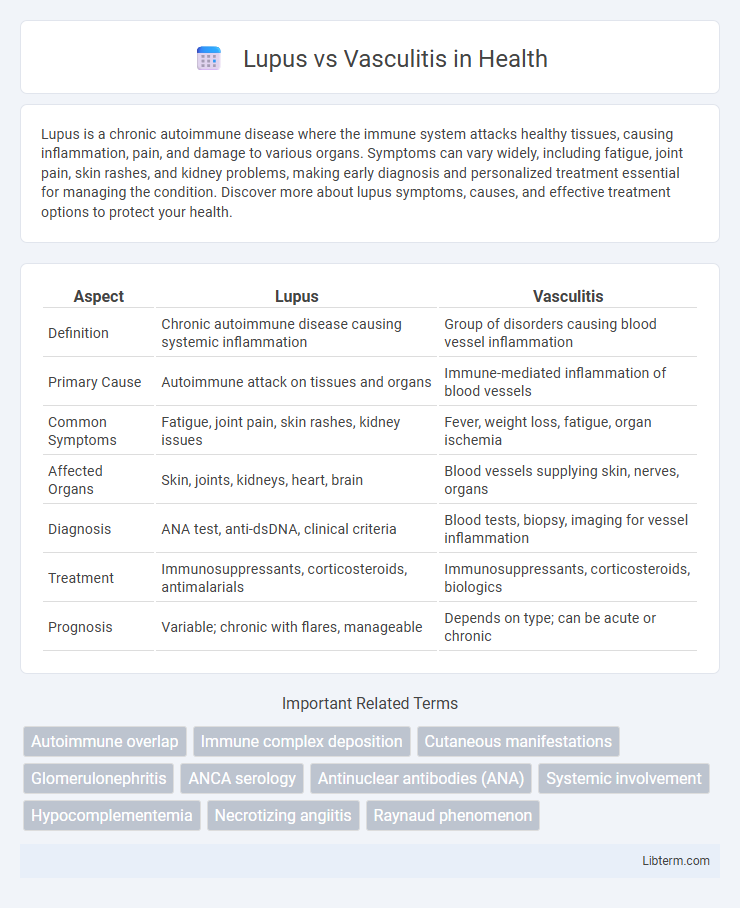Lupus is a chronic autoimmune disease where the immune system attacks healthy tissues, causing inflammation, pain, and damage to various organs. Symptoms can vary widely, including fatigue, joint pain, skin rashes, and kidney problems, making early diagnosis and personalized treatment essential for managing the condition. Discover more about lupus symptoms, causes, and effective treatment options to protect your health.
Table of Comparison
| Aspect | Lupus | Vasculitis |
|---|---|---|
| Definition | Chronic autoimmune disease causing systemic inflammation | Group of disorders causing blood vessel inflammation |
| Primary Cause | Autoimmune attack on tissues and organs | Immune-mediated inflammation of blood vessels |
| Common Symptoms | Fatigue, joint pain, skin rashes, kidney issues | Fever, weight loss, fatigue, organ ischemia |
| Affected Organs | Skin, joints, kidneys, heart, brain | Blood vessels supplying skin, nerves, organs |
| Diagnosis | ANA test, anti-dsDNA, clinical criteria | Blood tests, biopsy, imaging for vessel inflammation |
| Treatment | Immunosuppressants, corticosteroids, antimalarials | Immunosuppressants, corticosteroids, biologics |
| Prognosis | Variable; chronic with flares, manageable | Depends on type; can be acute or chronic |
Understanding Lupus and Vasculitis: Basic Definitions
Lupus is a chronic autoimmune disease where the immune system attacks healthy tissues, causing inflammation in organs such as the skin, joints, kidneys, and brain. Vasculitis refers to a group of disorders characterized by inflammation of blood vessels, which can result in vessel damage, reduced blood flow, and organ dysfunction. Both conditions involve immune system dysregulation but differ in their primary targets--lupus affects multiple organ systems broadly, while vasculitis specifically targets blood vessel walls.
Key Differences in Causes and Risk Factors
Lupus, an autoimmune disease, primarily results from genetic predisposition and environmental triggers such as sunlight and infections, which lead to the immune system attacking healthy tissues. Vasculitis, characterized by inflammation of blood vessels, often arises from autoimmune reactions, infections, or certain medications, with specific types linked to factors like age, infections, and genetic influences. Unlike lupus, vasculitis risk factors vary widely depending on the type, including giant cell arteritis affecting older adults and Kawasaki disease primarily impacting children.
Common Symptoms: How Lupus and Vasculitis Present
Lupus and vasculitis both present with systemic inflammation, causing symptoms like fatigue, joint pain, and skin rashes. Lupus frequently exhibits a butterfly-shaped facial rash and photosensitivity, while vasculitis often shows palpable purpura and ulcers due to blood vessel inflammation. Common overlapping symptoms include fever, weight loss, and muscle aches, reflecting their autoimmune nature.
Diagnostic Approaches: Tests and Clinical Findings
Diagnosing lupus and vasculitis requires specific tests such as antinuclear antibody (ANA) and anti-dsDNA assays for lupus, while vasculitis is often identified through elevated inflammatory markers like ESR and CRP, alongside ANCA testing. Clinical findings in lupus include malar rash, photosensitivity, and arthritis, whereas vasculitis typically presents with palpable purpura, neuropathy, and organ ischemia. Biopsy of affected tissues remains crucial for distinguishing between immune complex deposition in lupus and vessel wall inflammation in vasculitis.
Types and Subtypes: Varieties of Lupus and Vasculitis
Lupus primarily includes systemic lupus erythematosus (SLE), cutaneous lupus, drug-induced lupus, and neonatal lupus, each affecting different organs and presenting distinct symptoms. Vasculitis encompasses a wide range of types such as large vessel vasculitis (giant cell arteritis, Takayasu arteritis), medium vessel vasculitis (polyarteritis nodosa, Kawasaki disease), and small vessel vasculitis (granulomatosis with polyangiitis, microscopic polyangiitis). Understanding these subtypes is crucial for precise diagnosis and targeted treatment due to their varied pathological mechanisms and clinical manifestations.
Disease Progression and Complications
Lupus, or systemic lupus erythematosus (SLE), progresses through flares and remissions, frequently causing chronic inflammation that damages organs such as kidneys, joints, and the nervous system. Vasculitis encompasses a spectrum of disorders characterized by inflammation of blood vessels, often leading to vessel narrowing, aneurysms, or occlusion, which disrupts blood flow and can cause tissue ischemia or organ failure. Complications of lupus include lupus nephritis and cardiovascular disease, while vasculitis complications depend on vessel size involved, ranging from skin ulcers in small-vessel vasculitis to stroke or limb ischemia in large-vessel involvement.
Treatment Strategies: Medications and Therapies
Treatment strategies for lupus primarily involve immunosuppressive medications such as hydroxychloroquine, corticosteroids, and biologics like belimumab to control inflammation and prevent organ damage. Vasculitis treatment varies according to the type and severity but often includes high-dose corticosteroids and immunosuppressants such as cyclophosphamide or rituximab to reduce vascular inflammation. Both conditions may require symptom-specific therapies, including plasma exchange for severe cases of vasculitis or antimalarials for mild lupus symptoms, optimizing patient outcomes through tailored pharmacological interventions.
Managing Flares and Remissions
Managing flares and remissions in Lupus involves regular monitoring of symptom changes and adjusting immunosuppressive medications such as corticosteroids and hydroxychloroquine to control inflammation. Vasculitis management requires tight control of vascular inflammation using corticosteroids combined with immunosuppressive agents like cyclophosphamide or methotrexate to prevent organ damage during active phases. Both conditions benefit from individualized treatment plans, close follow-up with rheumatologists, and early intervention at the onset of flare symptoms to maintain long-term disease remission.
Long-term Prognosis and Quality of Life
Lupus and vasculitis both pose significant challenges to long-term prognosis and quality of life, with lupus frequently causing chronic inflammation affecting multiple organs, leading to potential kidney failure and cardiovascular complications. Vasculitis, depending on its type and severity, can result in vessel damage and organ ischemia, which may cause permanent disability if untreated. Effective management and early intervention in both conditions are crucial to improving survival rates and maintaining daily functioning and overall well-being.
Patient Support and Resources
Lupus and vasculitis patients benefit from specialized support groups and resources offered by organizations such as the Lupus Foundation of America and the Vasculitis Foundation, providing education, community connections, and advocacy. Access to multidisciplinary care teams including rheumatologists, dermatologists, and social workers is crucial for managing complex symptoms and treatment side effects effectively. Online forums, patient education workshops, and mental health counseling services help enhance quality of life and empower individuals to navigate their chronic conditions confidently.
Lupus Infographic

 libterm.com
libterm.com